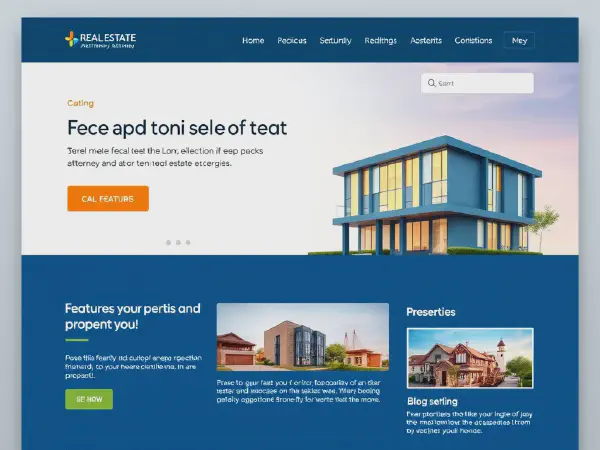Top Features of Effective Real Estate Attorney Websites

Creating Effective Real Estate Attorney Websites
Real estate attorney websites are essential platforms for legal professionals specializing in real estate law. These websites serve as a crucial marketing tool, providing potential clients with information about the attorney's services, expertise, and approach to real estate transactions. A well-designed website can attract clients and establish credibility in the competitive legal market.
An effective real estate attorney website should prioritize clarity and professionalism. Potential clients often seek legal representation for significant financial transactions, making it essential that the website conveys trustworthiness and expertise. This can be achieved by integrating user-friendly features, informative content, and strategic SEO practices to enhance visibility and engagement.
Explore the unique approaches in Real Law Digital real estate attorney marketing that can transform your legal practice's outreach.
In today's digital age, having a comprehensive online presence is not just beneficial but necessary. Real estate attorney websites should effectively communicate the attorney's qualifications, services, and client testimonials. Additionally, ensuring that the website is easily navigable and visually appealing will enhance user experience and increase the likelihood of client acquisition.
For cutting-edge insights in legal marketing, follow Real Law Digital for innovative strategies and expert advice.
Furthermore, blogs and resources on real estate law can position attorneys as thought leaders in the field. By offering valuable insights and up-to-date information on real estate legislation, attorneys can attract more visitors to their websites, converting them into potential clients. Thus, a strong content strategy is equally crucial for the success of real estate attorney websites.
Implementing effective Real Law Digital real estate law firm seo strategies is crucial for staying competitive in today's digital landscape.
Overall, a successful real estate attorney website must blend design, content, and SEO strategies to effectively reach and engage clients. By prioritizing these elements, attorneys can build a powerful online presence that fosters trust and encourages prospective clients to seek their legal services.
Design Essentials for Real Estate Attorney Websites
Responsive design is vital for real estate attorney websites, ensuring that the site adapts seamlessly to various devices, including desktops, tablets, and smartphones. With many users accessing websites on mobile devices, a responsive design enhances user experience, keeps visitors engaged, and improves website rankings in search engines.
User-friendly navigation is essential for potential clients navigating real estate attorney websites. Simplifying the structure, using clear labels, and providing quick access to important information, such as services offered, contact details, and resources, can significantly improve user engagement and satisfaction.
The use of professional images and branding within real estate attorney websites communicates professionalism and trust to potential clients. High-quality images of the attorney, office environment, and impactful visuals related to real estate can create a compelling impression and enhance brand identity.
Understanding the nuances of Real Law Digital real estate law firm marketing can significantly elevate your firm's visibility and client engagement.
Incorporating client testimonials is another critical element. Positive reviews and testimonials from previous clients can build credibility and influence potential clients' decisions. Displaying these testimonials prominently on the website provides social proof and exemplifies the attorney’s successes in real estate law.
Color schemes that reflect professionalism are essential in real estate attorney websites. Utilizing calming colors that convey trustworthiness and stability can help establish a sense of professionalism and reliability, fostering a favorable impression among potential clients.
Content Strategy for Real Estate Attorney Websites
Blog topics that educate clients on real estate law are integral to content strategy. Providing informative articles on legal processes, property transactions, and recent changes in real estate law positions the attorney as an expert and a valuable resource for clients seeking guidance.
Regular updates on local real estate market trends are also crucial. By reporting on trends, changes, and opportunities in the local housing market, attorneys can demonstrate their expertise while keeping clients informed and engaged with current issues affecting their property transactions.
FAQs addressing common legal concerns provide a practical resource for potential clients. Including a dedicated FAQ section on the website can help answer common queries related to real estate law, making it easier for visitors to find crucial information quickly and efficiently.
Guides for first-time real estate buyers are another effective content strategy. These guides can highlight key steps, potential pitfalls, and legal implications, effectively attracting novice buyers who may require legal assistance with their transactions.
Case studies highlighting successful transactions can serve as powerful marketing tools. By detailing specific cases and outcomes, attorneys can showcase their effectiveness and success in real estate law, building trust and credibility in the eyes of potential clients.
SEO Best Practices for Real Estate Attorney Websites
Keyword optimization specific to real estate law is fundamental for enhancing the visibility of attorney websites. By including relevant keywords throughout the website's content, attorneys can improve their rankings on search engines, making it easier for potential clients to find their services.
Utilizing local SEO to attract neighborhood clients is key. Optimizing the website for local search terms and including location-specific content will help real estate attorneys connect with clients in their geographic area, increasing the likelihood of client inquiries.
Meta tags and descriptions for better visibility also play a crucial role in SEO. Crafting unique and informative meta descriptions and title tags can improve click-through rates from search engine results, drawing more visitors to the site.
Quality backlinks from relevant sources can significantly boost the site's authority. Seeking opportunities to contribute articles to real estate blogs or other legal websites can create valuable backlinks, enhancing the website's credibility and search engine ranking.
Finally, mobile optimization for Google ranking is essential. As search engines prioritize mobile-friendly websites, ensuring that the real estate attorney website is optimized for mobile use can improve rankings and enhance user experience.
Lead Generation Techniques for Real Estate Attorney Websites
Effective use of contact forms and landing pages is a foundational lead generation technique for real estate attorney websites. Simplified contact forms that make it easy for potential clients to reach out can significantly increase conversion rates and inquiries.
Integration of chatbots for immediate client interaction can greatly enhance user experience. Chatbots can provide instant responses to common questions and guide potential clients through the services offered, encouraging them to engage with the attorney further.
Offering free consultations through the website is an excellent lead generation strategy. By promoting complimentary consultations, attorneys can encourage potential clients to reach out, allowing for personal interaction that can lead to engagement and conversion.
Email subscriptions for newsletters provide a platform for ongoing communication with potential clients. Offering valuable content through newsletters can help nurture leads and keep the attorney's services top-of-mind for potential clients.
Lastly, promotions for first-time clients or referrals can encourage inquiries and increase client acquisition. Highlighting these promotions on the website can attract new clients while incentivizing current clients to refer friends and family.
Compliance and Security for Real Estate Attorney Websites
Understanding legal requirements for attorney websites is essential for compliance and security. Attorneys must ensure that their websites adhere to regulations governing advertising, client confidentiality, and ethical considerations, establishing trust with potential clients.
Implementing SSL for client data security is crucial. A secure sockets layer (SSL) certificate encrypts data transferred between clients and the attorney’s website, protecting sensitive information and enhancing credibility.
Privacy policies that comply with regulations are an important aspect of website compliance. Clearly outlining how client data is collected, used, and safeguarded not only ensures compliance but also builds trust with potential clients.
Accessibility features for all users are an important consideration. Designing websites that comply with accessibility standards ensures that all potential clients, including those with disabilities, can easily access legal services.
Lastly, regular updates to maintain security are non-negotiable. Keeping the website’s infrastructure updated can help protect against data breaches and cyber threats, ensuring a safe environment for clients to engage with the attorney's services.
